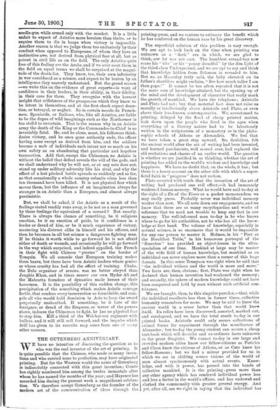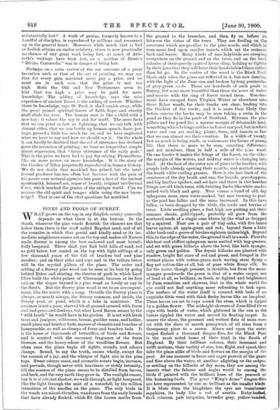THE GUTENBERG ANNIVERSARY.
WE have no intention of discussing the question as to who wds the real inventor of the art of printing. It is quite possible that the Chinese, who made so many inven- tions and who carried none to perfection, may have originated printing. But for the Western world the name of Gutenberg is indissolubly connected with this great invention; Comte has rightly numbered him among the twelve immortals after whom he has named the months of the year; and Mayenc,e has accorded him during the present week a magnificent celebra- tion. We therefore accept Gutenberg as the founder of the modern art of the communication of ideas through the
printing-press, and we venture to estimate the benefit which he has conferred on the human race by his great discovery.
The superficial solution of this problem is easy enough. We are apt to look back on the time when printing was unknown as a " dark " era in which, we are glad to think, our lot was not cast. The humblest errand-boy now scans his "bits" or his penny dreadful" by the dim light of the third-class Underground, and we are apt to say and think that knowledge hidden from Solomon is revealed to him. But so, as Macaulay truly said, the baby elevated on its father's shoulders might exclaim, "See how much taller I am than papa!" It cannot be too often repeated that it is not the mere aim of knowledge attained, but the opening up of the mind and the development of character that really mark the growth of mankind. We have the telephone; Aristotle and Plato had not; but that material fact does not raise us morally or intellectually above Aristotle and Plato, or even above their less-known contemporaries. We, accustomed to printing, deluged by the flood of cheap printed matter, look down upon the people who lived in the ages when everything of a literary nature had to be laboriously written in the scriptorium of a monastery or in the philo- sophic schools of Athens or Alexandria. We feel that we have taken a great step upward. So, doubtless, felt the ancient world after the art of writing had been invented, and learned parchments, well scored over, had replaced the old recitations and chants of an earlier world. The question is whether we are justified in so thinking, whether the art of printing has added to the world's wisdom and knowledge and happiness. We have no doubt that, on the whole, it has ; but there is a heavy account on the other side with which a super- ficial faith in " progress " does not reckon.
Plato asserted with truth that the invention of the art of writing had produced one evil effect,—it had immensely weakened human memory. What he would have said to-day at
the sight of a file of the Times or a pocket memorandum we may easily guess. Probably never was individual memory
weaker than now. We all note down our engagements, and we know that there are so many encyclopedias and works of reference that we need not trouble to keep any fact in our memory. The well-informed man to-day is he who knows where to go for his authorities, not he who has all the know- ledge at first hand. The volume of knowledge, especially in natural science, is so enormous that it would be impossible for any one person to master it. Holmes, in his "Poet at the Breakfast Table," in his humorous portrayal of the " Scarabee " has provided an object-lesson in the ultra- specialism of our time. Mankind at large may be master of the wide field of human knowledge, but mankind as an individual can never explore more than a corner of this huge
domain. In this sense Tennyson was right when he said that "the individual withers and the world is more and more.-
Two facts are, then, obvious: first, Plato was right when he declared that human invention had weakened the memory; and secondly, the sphere of modern knowledge could not have been conquered and held by man without such artificial con- trivance.
We are brought, then, to this singular paradox,—that, while the individual recollects less than in former times, collective humanity remembers far more. We may be said to know the ancient world in a sense better than that world knew itself. Its relics have been discovered, assorted, marked out, and catalogued, and we have the total result to-day in our printed books. Aristotle could only secure collections of animal forms for experiment through the munificence of Alexander; but to-day the young student can secure a cheap text-book which will describe and co-ordinate facts unknown to the great Stagirite. We cannot to-day in our large and crowded modern cities know our fellow-citizens as Pericles and Cleon knew the citizens of Athens, or, as Cato knew his fellow-Romans; but we find a mirror provided for us in which we see in shifting scenes visions of the world of man almost synchronously with actual events. Know- ledge, and with it power, has passed into the hands of collective mankind. , It is the printing - press more than any other agency which has rendered individual power less and less a factor in the world's affairs, and has endowed and clothed the commonalty with greater general energy. And yet, after all, are we right in saying that the individual has substantially lost? A work of genius, formerly known to a handful of disciples, is reproduced by millions and treasured up in the general heart. Moreover, while much that is bad or foolish attains an undue celebrity, there is now practically no chance of any great work being lost, as much of Aris- totle's writings have been lost, as a portion of Dante's "Divina, Commedia " was in danger of being lost.
Perhaps, on a calm review of the net outcome of a great invention such as that of the art of printing, we may say that for every gain mankind must pay a price, and we must see in each ease that the price is not too high. Both the Old and New Testaments seem to hint that too high a price may be paid for mere knowledge. The adding of knowledge, says the wise experience of ancient Israel, is the adding of sorrow. Whether there be knowledge, says St. Pau], it shall vanish away, while the great primal spiritual forces of faith, hope, and charity shall abide for ever. The human race is like a child with a new toy; it values the toy in and for itself. The mere facts that we can print as fast as lightning, that we can talk with distant cities, that we can bottle up human speech, have, per- haps, proved a little too much for us, and we have neglected what we have to say and how we should say it. On the whole it can hardly be doubted that the art of utterance has declined since the invention of printing; we have no longer that simple, direct expression, that "large utterance of the early gods." This is the price we have had to pay for seizing, Prometheus- like, on mere power, on mere knowledge. It is the story of the Garden of Eden perpetually reproduced in human history. We do not doubt that mankind has gained, but the intel- lectual producer has too often lost because with the gain 9f his power over natural agencies has gone a loss of the ancient spontaneity, leisured art, sense of beauty, original intellectual force, which marked the genius of the antique world. Can we recover the old spirit and temper while using the new know- ledge? That is one of the vital questions for mankind.



















































 Previous page
Previous page